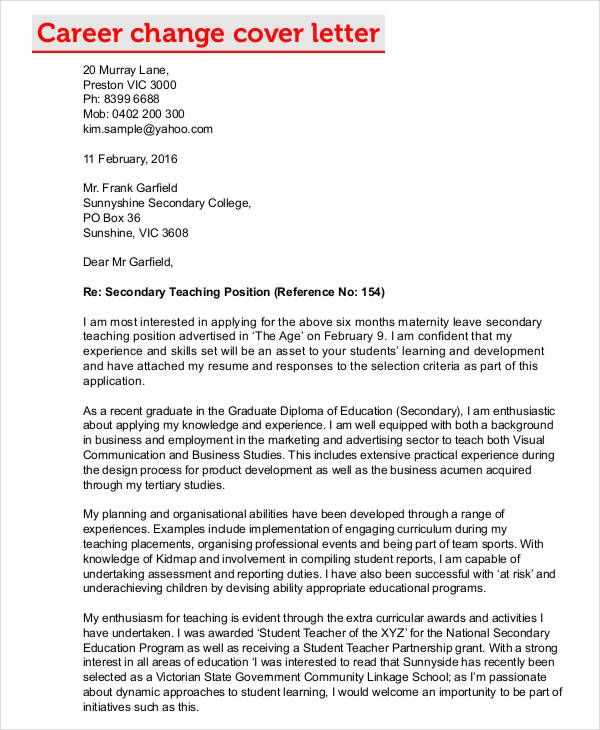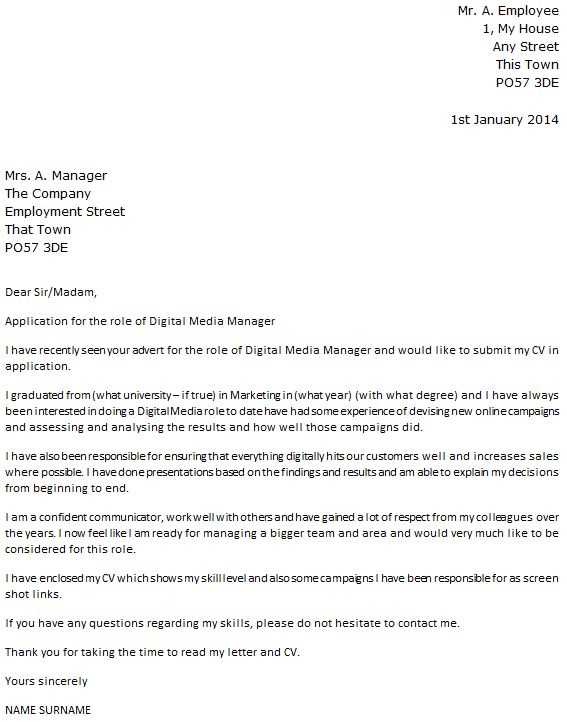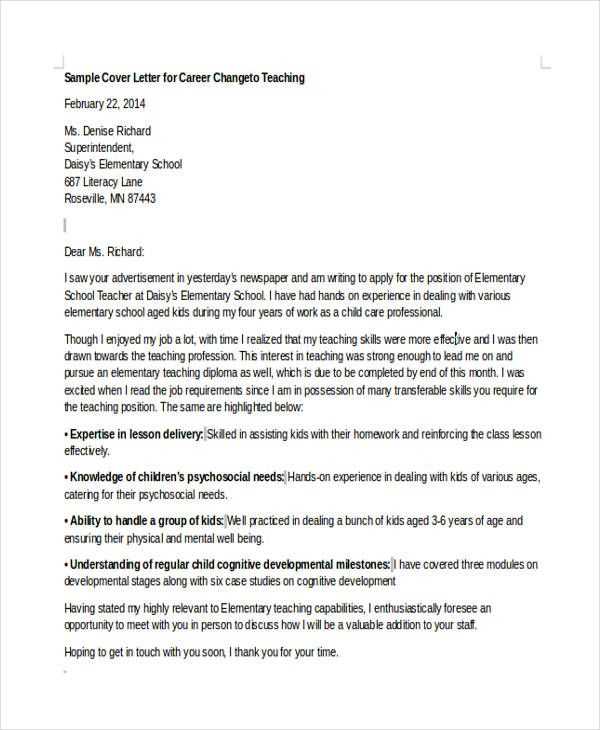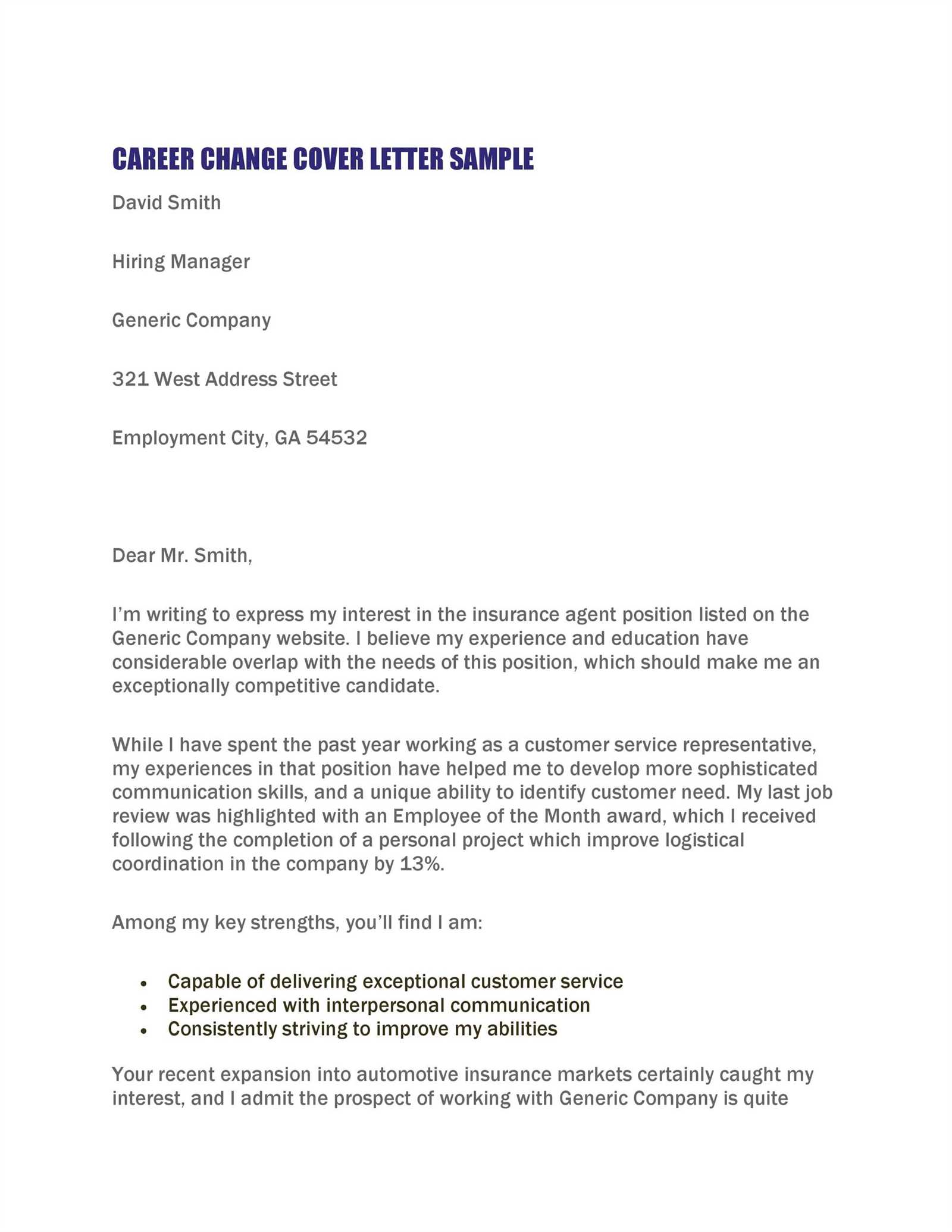Cover Letter Template for Career Change

Transitioning to a new profession often requires a thoughtful approach when presenting your qualifications to potential employers. The first step in making this shift is crafting a well-structured application that highlights your strengths and adaptability. A well-written application can make all the difference in securing an interview, even if you’re entering a completely different field.
Emphasizing transferable skills and demonstrating how your past experiences align with the role you’re aiming for will help you stand out. Understanding what employers in a new industry value and addressing those aspects directly is key to positioning yourself as a strong candidate.
By focusing on your relevant expertise and presenting it clearly, you show potential employers that you’re not just looking for any job, but are committed to applying your unique background to their specific needs. The right approach can make a challenging transition much smoother and increase your chances of success.
How to Craft a Compelling Application
Creating a persuasive application requires more than simply listing your qualifications. To capture the attention of hiring managers, it’s important to present a tailored narrative that demonstrates why you’re a strong fit for the role despite a lack of direct experience in the field. A well-crafted application should connect your background to the skills the employer values most, establishing a clear link between your past achievements and the new role you’re pursuing.
Focus on Transferable Skills
Identify and highlight the skills you’ve developed in previous roles that can be applied to the position you’re aiming for. Even if the industries are different, there are often common skills–such as communication, problem-solving, and leadership–that can transfer seamlessly. Show how these abilities will help you succeed in the new environment, and how you’ve demonstrated them in past experiences.
Tailor Your Approach to the New Field
Each industry has its own set of expectations and values, and it’s crucial to align your narrative with these specific requirements. Research the company’s culture and the role’s key responsibilities to adjust your message accordingly. This demonstrates that you’ve not only put thought into your application but are also genuinely interested in the position and the organization.
Adapting Your Experience for a New Role
When shifting to a different profession, it’s essential to rethink and reframe your prior work to show its relevance to the new position. Even if your past roles seem unrelated, many skills and achievements can be translated in a way that showcases your value to potential employers. The key is identifying what you’ve done in previous positions that will benefit you in this new environment.
Show how past responsibilities relate to the new job. Focus on tasks you’ve handled before that required similar skills, such as team collaboration, project management, or customer engagement. Emphasize how these responsibilities can be beneficial in the new role, highlighting that your experience is versatile and adaptable.
Quantifying your accomplishments can be an effective way to demonstrate your capabilities. Instead of simply stating what you’ve done, provide measurable outcomes, such as increased efficiency or revenue, to prove your impact. This strategy makes it easier for hiring managers to visualize the contributions you could bring to their organization.
Key Elements to Include in Your Application
When crafting your application for a new position, it’s important to ensure that certain key elements are included to make a strong impact. These elements not only highlight your qualifications but also demonstrate your understanding of the role and your motivation to succeed in the new field. Below are the essential components to focus on when building your application.
- Personal Introduction – Start with a brief introduction that captures the hiring manager’s attention. Include your name and the position you’re applying for, along with a short statement about why you are interested in the role.
- Relevant Skills – Highlight skills that directly align with the position. These may include technical skills, soft skills, or other expertise you’ve gained that will contribute to your success in the new job.
- Professional Experience – Even if your prior roles are in a different field, emphasize transferable skills. Focus on how your previous experiences are relevant to the job you’re pursuing and how they will help you excel in the new environment.
- Motivation for the Role – Express your enthusiasm for the position and explain why you’re passionate about making the transition. Show that you’re eager to contribute to the company’s success.
- Closing Statement – End with a professional conclusion, expressing your willingness to discuss your qualifications in more detail. Include a call to action, such as a request for an interview, and thank the hiring manager for their consideration.
Common Mistakes to Avoid in Career Transition Applications
While crafting an application for a new role, it’s easy to make missteps that can diminish the impact of your message. Recognizing and avoiding these common mistakes will help ensure that your application stands out for all the right reasons. A clear, concise, and well-structured application is essential when transitioning to a new industry or job function.
Overloading with Irrelevant Information
It’s tempting to include all past achievements, but focusing on irrelevant details can detract from your main message. Employers are more interested in how your background aligns with the specific position you’re applying for, rather than a detailed history of every job you’ve ever held.
Failing to Show How You’ll Add Value

Many applicants focus too much on their personal background without explaining how their experience will benefit the new organization. It’s crucial to demonstrate how your skills and achievements will contribute to the success of the team and company.
| Common Mistake | Why to Avoid It | How to Correct It |
|---|---|---|
| Being Too Generic | General statements don’t showcase your unique qualities or how you fit the role. | Tailor your application to each specific job and industry, providing detailed examples. |
| Neglecting Proof of Achievements | Without measurable results, your qualifications can appear vague. | Include concrete examples and metrics to support your skills and experience. |
| Overly Formal or Impersonal Tone | Overly formal language can come across as stiff or disconnected. | Use a conversational but professional tone to show personality and enthusiasm. |
Tailoring Your Application to Specific Industries
When applying for a role in a new field, customizing your message to align with the specific industry is essential. Each sector has its own expectations, values, and terminologies, and showcasing an understanding of these nuances can significantly boost your chances. Tailoring your application allows you to demonstrate that you’ve done the necessary research and are genuinely interested in transitioning to that particular field.
In order to craft an effective application for a specific industry, consider adjusting your tone, language, and the skills you emphasize. Some industries, such as finance or healthcare, may prioritize technical proficiency and certifications, while others, like creative fields, may place a greater emphasis on innovative thinking and problem-solving abilities. Understanding these preferences will help you highlight the most relevant aspects of your background.
Showcasing Transferable Skills Effectively
When moving to a new field, one of the most powerful ways to demonstrate your value is by highlighting the skills you’ve developed in previous roles that can be applied in the new position. These abilities are often not industry-specific, but they remain highly relevant and can help you succeed in unfamiliar environments. Effectively showcasing these transferable skills can set you apart from other candidates who may have more direct experience but lack the flexibility and adaptability you bring.
Identifying Transferable Skills

The first step is to identify the abilities you’ve gained that could be useful in a new role. Some examples include:
- Communication Skills – The ability to clearly convey ideas and collaborate with colleagues is vital in any field.
- Leadership and Teamwork – Experience in managing teams or working within teams can translate across most industries.
- Problem-Solving – Being able to address challenges and find innovative solutions is always in demand.
- Time Management – The ability to meet deadlines and prioritize tasks is valuable in any job.
Demonstrating Transferable Skills in Your Application

Once you’ve identified these transferable skills, it’s important to demonstrate how they’ve been applied in your previous roles. Instead of simply listing your strengths, provide specific examples of how you used these skills to achieve success. For instance, you might describe a time when you solved a problem that helped increase efficiency or explain how you managed a team to meet a tight deadline.
Using Action Words to Impress Employers
In a competitive job market, the language you use can make all the difference. Action words, or strong verbs, are a powerful way to convey your skills and accomplishments with confidence. These words demonstrate initiative and help employers quickly understand the impact you could have in their organization. By using dynamic language, you can highlight your achievements and showcase your suitability for the role more effectively.
Why Action Words Matter
Employers often skim through numerous applications, so it’s crucial to capture their attention quickly. Action words help make your experience stand out by clearly illustrating the actions you took to achieve specific results. Rather than simply stating your duties, action verbs show how you took charge and made a measurable impact.
Examples of Powerful Action Words
Incorporating action words into your application can significantly enhance its appeal. Here are some examples of powerful verbs to consider:
- Led – Demonstrates leadership and responsibility.
- Developed – Showcases creativity and innovation in problem-solving.
- Streamlined – Highlights efficiency and optimization efforts.
- Achieved – Emphasizes tangible results and goal accomplishment.
- Collaborated – Illustrates teamwork and cooperative efforts.
By carefully selecting action words, you can make your experience more impactful and show potential employers that you’re proactive and results-driven.